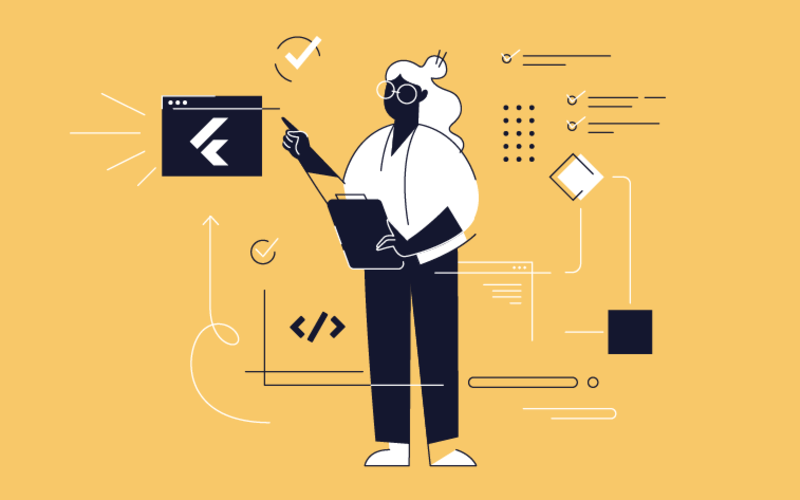In recent years, Flutter has emerged as a revolutionary open-source framework designed by Google. Its primary appeal lies in its ability to craft high-performance, multi-platform applications with a native feel from a single codebase. It does that by granting developers a fine-grained level of control over every pixel on the screen and compiling directly into machine code (or JavaScript, if targeting web platforms).
One of Flutter's standout features is its suite of developer productivity tools. The Hot Reload functionality is a game-changer, allowing instantaneously visualize changes in the app's interface as the code is adjusted in real-time.
Endorsed and utilized by Google, Flutter has rapidly gained the trust of many well-known brands. Its growing adoption is an indicator of its reliability and effectiveness, not to mention an ever-expanding community of developers and corporations, making it a forward-thinking choice for any entity looking to deliver high-fidelity applications.
Demand for Flutter developers
The Flutter 2023 Strategy document highlights Flutter's remarkable footprint in the app development ecosystem. With over 700.000 apps in the Play Store, Flutter's utility in creating one in five new apps surpasses all other cross-platform frameworks combined. A Statista developer survey from 2022 reinforces Flutter's status as the most popular choice among developers.
Noteworthy applications such as AWS Amplify, Rive, SNCF Connect, and Wolt all use Flutter. Toyota uses Flutter for its infotainment systems in vehicles.
These statistics not only showcase Flutter's popularity but also indicate a robust and growing developer community that favors its comprehensive capabilities for building versatile, high-quality applications. This is especially important for companies looking to build cross-platform mobile applications or targeting both mobile and web. And that also underpins the importance of knowing what to look for when hiring Flutter developers.
Hiring Flutter developers
Here are the ins and outs of a roadmap that will bring you skilled Flutter talent to your team.
What is the job of a Flutter developer actually like?
Describing a Flutter developer's job is not a straightforward task, simply due to the multifaceted role such professionals play. At its core, the job is to be proficient in the Dart programming language and the Flutter framework itself. But it is important to note that Flutter developers have to navigate configurations of different target platforms, and while not always required, be proficient in writing platform-specific code (Kotlin/Java for Android, Swift/Objective-C for iOS), or even low-level code (C or C++).
Beyond pure development, they need to understand mobile app stores' processes and deployment strategies for web applications, and have a grasp of security principles.
Mobile platforms change rapidly, and part of a Flutter developer's job is to track these changes, be ready for them, and know how to respond to breaking changes they may introduce.
When do you need a Flutter developer?
You'll recognize the need for a Flutter developer when your company wishes to deliver an application available on multiple platforms or faces the challenge of maintaining existing multiple codebases across various platforms, where aligning features and UI can be resource-intensive.
Flutter streamlines this process, offering a single codebase solution that ensures consistency in branding and features across platforms and delivers a faster development cycle than native technologies. With a better overall developer experience than other cross-platform frameworks, hiring a Flutter developer, individually or as a team, translates to substantial savings in time, costs, and project management efforts.
Interviewing a Flutter developer
Here are some actionable tips to help you interview and vet the skills of you Flutter candidates.
Technical skills to look for in a Flutter developer
Despite reaching the status of a mature framework, Flutter is still evolving, with ongoing discussions in the community about best practices and standards. A Flutter developer must have a firm grasp of the Dart programming language and its newest features, as well as a deep understanding of the Flutter framework itself.
They should be well-versed in networking with RESTful APIs, GraphQL, gRPC, and real-time communication through sockets. Knowledge of solutions like Firebase and Supabase is also key, along with a strong sense of platform-specific UI nuances, performance optimization, and architectural principles.
Additionally, developers should demonstrate proficiency in testing, including unit, widget, and integration tests, and be adept in CI/CD pipelines specifically for Flutter applications. Git remains the version control system of choice, and familiarity with it is essential.
While not always mandatory, a developer with knowledge of native programming languages, cybersecurity principles, the software development lifecycle, and architectural patterns undoubtedly stands out. These competencies ensure a developer can build maintainable, scalable, and testable apps that can grow from small to large-scale projects efficiently.
We asked Zoran Conevski, a Fullstack Developer, to share some of the expert technical skills a Flutter developer should have. He says:
Good knowledge in software architecture is crucial and knowledge in Dart and system design. Hand in hand with this, it is a must-have for a Flutter developer to know how to set up the suitable and proper app architecture, which makes the project maintainable and easy to use and control in the long run. Additionally, Dart and Flutter's best practices are desirable, especially regarding optimization and performance.
A great Flutter developer differentiates from a good one, adds Conevski, primarily by the way they use and implement the app architecture, all state management solutions, and, of course, the testing itself.
A great Flutter developer will create and write all the tests for the Flutter apps. Most of the time, a great Flutter developer has tried several different architectural approaches, and they also express their opinion freely about how they would do things. They should also be able to explain why they would do something different and back it up with valid reasons.
Benefits of Flutter according to developers
Developers are lauding Flutter for attributes that significantly enhance the development process:
- Rapid MVP development: Flutter's efficiency shines in prototyping, allowing teams to swiftly transition from concept to a functional MVP, facilitating faster feedback and iteration.
- Accelerated development cycle: the framework's ease of use and hot reload feature drastically cut down development timelines, enabling a quicker go-to-market strategy.
- A rich ecosystem of packages: a vast repository of pre-built packages simplifies feature integration, reducing the need to build complex functionalities from scratch.
- Supportive community: Flutter's community is known for its openness and collective expertise that drives innovation and provides comprehensive support.
Zoran, a seasoned developer, speaks to its practicality:
“We use Flutter for cross-platform mobile app development for iOS and Android. With the recent upgrading in the years, it can now support platforms like Web, Desktop (Mac, Linux, Windows), and such embedded devices. Amazingly, you need just one code base for software building that successfully runs on mobile, desktop, and web”.
Interview questions and answers for Flutter developers
If you don’t know how to directly check the Flutter knowledge of you potential team mate, here are some questions we would suggest, and their respective answers.
1. Can you explain what a Widget is in Flutter and its importance?
Expected answer: In Flutter, a Widget is the basic building block, a part of the UI representing elements like a button, a menu, a dialog, etc. Widgets handle user interaction and are important because they are the core components of the UI in any Flutter application.
2. Describe the difference between a StatefulWidget and a StatelessWidget in Flutter.
Expected answer: A StatelessWidget is immutable, meaning that its properties can’t change – all values are final. A StatefulWidget is dynamic and can update its state data, triggering a UI redraw.
3. What is a BuildContext?
Expected answer: BuildContext is a reference to the location of a Widget within the tree structure of all the Widgets which are built. It's used by Flutter to determine how to render and position Widgets.
4. How do you manage state in Flutter applications?
Expected answer: State can be managed in Flutter using various approaches like:
- Local state management with StatefulWidget.
- Global state management with packages like Provider, BLoC, Riverpod or Redux.
5. What are the different build modes that Flutter supports?
Expected answer: When you are in a specific development phase, your code is compiled in various modes, and the framework does this itself. These multiple modes are called build modes. Flutter has special tools that compile your app in three modes – Debug, Profile, and Release.
6. Explain the use of keys in Flutter.
Expected answer: Keys are used in Flutter to uniquely identify Widgets, elements, and their state. They are critical when preserving state when Widgets move around in the tree or are used within collections like Lists.
7. Describe what Hot Reload is and how it works.
Expected answer: Hot Reload is a feature in Flutter that allows developers to inject updated source code files into a running Dart Virtual Machine (VM). It updates classes with new versions of fields and functions, enabling rapid development cycles without needing to restart the application.
8. How can you access platform-specific functionality in Flutter?
Expected answer: Platform-specific functionality can be accessed through platform channels. Recently, there has been a surge in popularity of an official library called Pigeon which brings type safety through code generation.
9. Can you explain what Streams are in Dart, and how are they used in Flutter?
Expected answer: Streams provide a way to react to asynchronous events. In Flutter, they're often used to listen for user input, data changes, or to interact with I/O sources.
10. Explain the concept of InheritedWidget and its use cases.
Expected answer: InheritedWidget is a way to efficiently propagate information down the widget tree. It's used to share data across multiple widgets without having to pass the data through constructors.
Benefits of Flutter
As we’ve mentioned many times by now, Flutter's singular codebase is a game-changer in the realm of app development. It embodies the “write once, run everywhere” philosophy making it an attractive proposition for businesses looking to deploy apps across a broad spectrum of devices and platforms.
Performance in Flutter is most likely the most compelling selling point. By compiling directly to ARM or x86 machine code, Flutter applications run with speed and agility that rivals native applications. This ensures a smooth, responsive user experience, regardless of the complexity of the project; from loading items into a list to incredibly sophisticated niche use cases.
And that touches another important point, a consistent and beautiful user interface is vital for brand recognition and user engagement. The ability to use either pre-made components, or craft your own is vitally important for brands looking to deliver the same look and feel across any platform.
The framework's community and Google's support are invaluable assets. A vibrant ecosystem of developers contributes to a vast library of packages and plugins, easing the integration of new features and reducing development time. Google's backing ensures that Flutter is consistently updated, maintaining its modernity and relevance in a fast-paced industry.
By choosing Flutter, companies are not just selecting technology for development; they are investing in an ecosystem that promises quality, efficiency, and innovation.
 Norsk
Norsk























